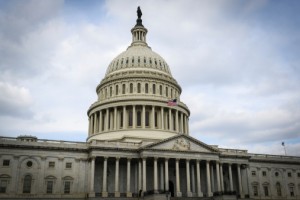
Collaboration in Action SAVE THE DATE! November 18, 2016 San Juan
In: News, Newsletters
Loading the content... Loading depends on your connection speed!



Mar 31, 2014 05:47 pm | posted by Chris Dimick | AHIMA & Coding & reimbursement & ICD-10
The Senate voted today to approve a bill that will delay the implementation of ICD-10-CM/PCS by at least one year. The bill now moves to President Obama, who is expected to sign it into law. The bill was passed 64-35 at 6:59 pm ET on Monday, March 31.
 The bill, H.R. 4302, Protecting Access to Medicare Act of 2014, mainly creates a temporary “fix” to the Medicare sustainable growth rate (SGR). A seven-line section of the bill states that the Department of Health and Human Services (HHS) cannot adopt the ICD–10 code set as the standard until at least October 1, 2015. The healthcare industry had been preparing to switch to the ICD-10 code set on October 1, 2014.
The bill, H.R. 4302, Protecting Access to Medicare Act of 2014, mainly creates a temporary “fix” to the Medicare sustainable growth rate (SGR). A seven-line section of the bill states that the Department of Health and Human Services (HHS) cannot adopt the ICD–10 code set as the standard until at least October 1, 2015. The healthcare industry had been preparing to switch to the ICD-10 code set on October 1, 2014.
In a statement on the Senate vote, AHIMA officials said they will work to clarify outstanding questions raised by the delay and continue to work with government officials to implement ICD-10.
“On behalf of our more than 72,000 members who have prepared for ICD-10 in good faith, AHIMA will seek immediate clarification on a number of technical issues such as the exact length of the delay,” said AHIMA CEO Lynne Thomas Gordon, MBA, RHIA, CAE, FACHE, FAHIMA. “AHIMA will continue our work with various public sector organizations and agencies such as the Centers for Medicare and Medicaid Services (CMS), the Office of the National Coordinator for Health IT, and the National Center for Health Statistics (NCHS) along with our industry partners such as the ICD-10 Coalition so that ICD-10 will realize its full potential to improve patient care and reduce costs. These are goals that AHIMA and other healthcare stakeholders and our government leaders all share.”
Since the transition to ICD-10 “remains inevitable and time-sensitive because of the potential risk to public health and the need to track, identify, and analyze new clinical services and treatments available for patients,” AHIMA said in a statement the organization will continue to lend technical assistance and training to stakeholders as they are forced to navigate the challenge of preparing for ICD-10 while still using ICD-9.
Thousands of AHIMA members and ICD-10 proponents contacted their congressional representatives and senators over the last week asking them to vote against the SGR bill and not delay ICD-10.
Congress was working against a deadline of today, March 31, to reform or “fix” the SGR before it directly impacted physician payment. Without a fix to the SGR formula, Medicare physicians faced a 24 percent reimbursement cut beginning April 1. H.R. 4302, introduced by House Representative Joseph Pitts (R-PA), will replace the reimbursement cut with a 0.5 percent payment update through the end of 2014 and a zero percent payment update from January 1, 2015 to March 31, 2015.
Physician groups, including the American Medical Association and a coalition of nearly 90 state and national medical societies, have come out against H.R. 4302 since it does not provide a long-term solution to the SGR issue. The insertion of the ICD-10 delay section into H.R. 4302 was likely done to placate physicians who are against an SGR patch. The AMA has said they are against moving to ICD-10 entirely.
The original House bill was negotiated at the senior leadership level and quickly pushed through the House on March 27 via a voice vote, where no roll call was taken, no votes were tallied, and with the majority of representatives still out on a previously called recess.
“There’s no integrity in what we’re getting ready to vote on,” remarked Senator Tom Coburn (R-OK) as he spoke against passage of the bill despite the pressing deadline. Drawing a comparison with the principles of medicine that you don’t treat symptoms but instead treat the disease, Coburn also noted that the continued passage of SGR patches represents a corruptible process that hides truth from the consumer and demonstrates a lack of transparency from Congress. Coburn also displayed a poster that he said characterized Congress’s current methods during his speech that read “Put Off Until Tomorrow What You Should Be Doing Today.”
On Monday Senate Finance Chairman Ron Wyden (D-OR) did introduce a new SGR bill, S. 2157, that did not include the ICD-10 delay provision and would have addressed not just a “fix” for SGR but wider reform. However, Sen. Jeff Sessions (R-AL) objected to voting on S. 2157 and instead proposed the Senate vote on S. 2122, a SGR reform bill introduced on March 12 and sponsored by Sen. Orrin Hatch (R-UT) that would also repeal the individual insurance mandate of the Affordable Care Act. This vote was also objected to by senators, who in the end voted on H.R. 4302 which put off larger SGR reform to the future and delayed ICD-10 for at least one year. This legislation will become the 17th patch of the SGR since 1997.
This is the second time ICD-10 implementation has been delayed. The original compliance date of October 1, 2013 was officially pushed back a year on September 5, 2012 by CMS, who noted in their ICD-10 delay final rule that “some provider groups have expressed strong concern about their ability to meet the October 1, 2013 compliance date and the serious claims payment issues that might ensue if they do not meet the date.”
But this recent legislative call for a delay likely came as a surprise to CMS. On February 27 CMS Administrator Marilyn Tavenner announced at the Health Information and Management Systems Society Annual Conference that ICD-10 would not be delayed any further, stating “we have already delayed the adoption standard, a standard the rest of the world has adopted many years ago, and we have delayed it several times, most recently last year. There will be no change in the deadline for ICD-10.”
The impending delay of ICD-10 raises a vast slate of questions for coding professionals, provider administrators, education entities, and even the federal government. The focus will likely turn to CMS, who will need to provide the healthcare industry guidance on the exact new implementation deadline and how to move forward.
The delay of ICD-10 impacts much more than just coded medical bills, but also quality, population health, and other programs that expected to start using ICD-10 codes in October. The extent of the logistical challenges and costs associated with “dialing back” to ICD-9-CM are not yet fully understood, AHIMA officials said, but are expected to be extensive.
CMS has estimated that another one-year delay of ICD-10 would likely cost the industry an additional $1 billion to $6.6 billion on top of the costs already incurred from the previous one-year delay. This does not include the lost opportunity costs of failing to move to a more effective code set, AHIMA said.
Many coding education programs had switched to teaching only ICD-10 codes to students, hospitals and physician offices had begun moving into the final stages of costly and comprehensive transitions to the new code set—even the CMS and NCHS committee responsible for officially updating the current code set changed the group’s name to the ICD-10-CM/PCS Coordination and Maintenance Committee.
The delay directly impacts at least 25,000 students who have learned to code exclusively in ICD-10 in health information management (HIM) associate and baccalaureate educational programs, AHIMA said in a statement.
The United States remains one of the only developed countries that has not made the transition to ICD-10 or a clinical modification. ICD-10 proponents have called the new code set a more modern, robust, and precise coding system that is essential to fully realizing the benefits of recent investments in electronic health records and maximizing health information exchange.
While today’s vote delayed ICD-10 implementation, AHIMA officials said they will continue working to ensure that another delay does not occur legislatively. Over the upcoming weeks, updates will be added to AHIMA’s Advocacy Assistant with instructions on how members can continue to advocate their members of Congress on behalf of ICD-10.
“As demands for quality healthcare data continue to increase, this delay will add an additional significant hurdle for the healthcare system to fill these important HIM positions,” Thomas Gordon said. “It is truly unfortunate that Congress chose to embed language about delaying ICD-10 into legislation intended to address the need for an SGR fix in their effort to temporarily address the long outstanding and critically important physician payment issues.”